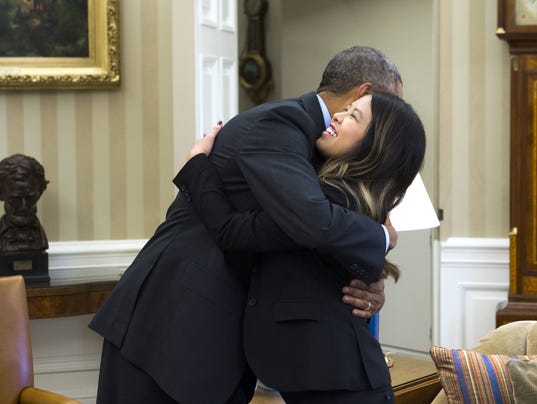

US media have been silent about this elephant in the room: those who recover from Ebola are likely to have positive PCR tests of semen, vaginal fluid, breast milk, urine and skin (including sweat) for one to several months after recovery. There are several anecdotes describing disease transmission to a partner following recovery. Because it is so difficult to culture Ebola virus, no one knows whether patients remain contagious (or how contagious, or how long) during this post-recovery period. The CDC and US media have preferred to show pictures of big hugs from Ebola patients as soon as they leave the hospital, in a calculated attempt to make light of this issue. Both President Obama and NYC Mayor DeBlasio were recipients of such skin contact. I have to ask:
Do you feel like chumps now, guys? Your public health officials, with their oft-quoted "abundance of caution" missing in action, put you in harm's way for some photo-ops -- photos designed to give the exactly wrong message to the American people, that those who recovered were absolutely not contagious.
UPDATE: The Mayo Clinic provides a more accurate description of the recovery process: "For people who survive, recovery is slow. It may take months to regain weight and strength, and the viruses remain in the body for weeks. People may experience:
- Hair loss
- Sensory changes
- Liver inflammation (hepatitis)
- Weakness
- Fatigue
- Headaches
- Eye inflammation
- Testicular inflammation"
India has dealt with the
issue of potential long-term infectivity during convalescence with enforced quarantine. From TIME:
[A] 26-year-old man is being isolated in a facility at Delhi’s Indira Gandhi International airport, The Times of India reports.
According to the Times, the man had already been treated for Ebola in West Africa, currently does not have symptoms and tested negative for the virus before he flew. However, his semen tested positive for the virus.
He had a medical clearance certificate from the Liberian government saying the had been treated and was confirmed negative from blood tests—that would deem him Ebola-free, according to the World Health Organization and Centers for Disease Control and Prevention (CDC). His blood also tested negative in India. Semen can test positive after clinical clearance for up to three months, according to the CDC. The agency recommends abstinence from sex—including oral sex—for at least six months. If abstinence cannot be followed, the CDC recommends condoms to prevent disease spread.According to Reuters, "Many experts say densely populated India is not adequately prepared to handle any spread of the highly infectious hemorrhagic fever among its 1.2 billion people."
But according to many experts here, here and here, no country is prepared for Ebola, since none have the capacity to properly contain the virus outside a handful of bio-containment centers. Ebola may be the game-changer for which no nation is prepared. Without fanfare, CDC has tacitly acknowledged this truth. Today's Associated Press discusses the new units being built by a few hospitals across the country, in a piece titled Hospitals Improvise Ebola Defense, at a Cost. Now only 20 US hospitals will be allowed to handle Ebola, quite a paring down from "all US hospitals" that CDC Director Frieden said could handle Ebola only 2 short months ago:
The U.S. Centers for Disease Control and Prevention is in the process of putting together a list of around 20 hospitals nationwide that it will certify as having the right safeguards in place to treat patients with Ebola.
UPDATE Nov 19: Nicole Lurie, the DHHS Assistant Secretary for Preparedness and Response since Obama took office, is the person
responsible for doling out many billions of dollars to get the US
"prepared." It seems she finally sees the light. Testifying at a
Congressional hearing yesterday, Lurie said, “Ebola has told us that we really need high-containment facilities.” And it's a win-win for Lurie: think of the new funds that will flow through her hands now.



















No comments:
Post a Comment